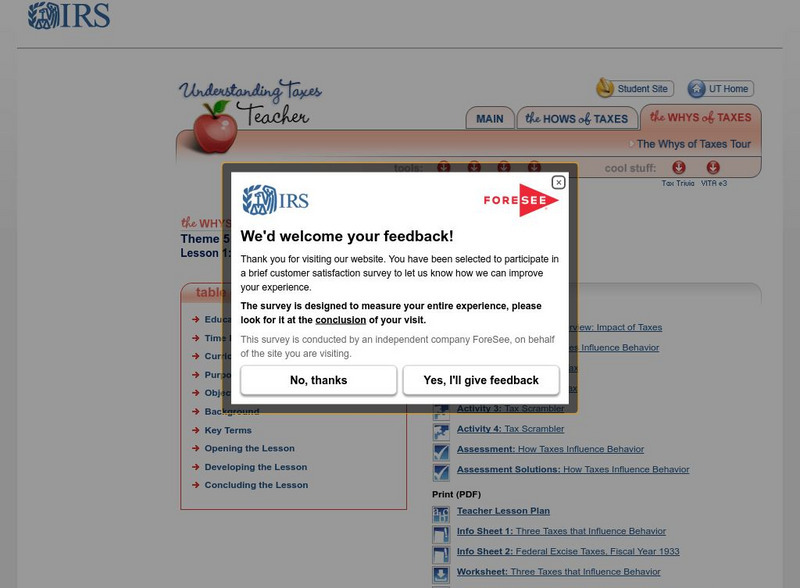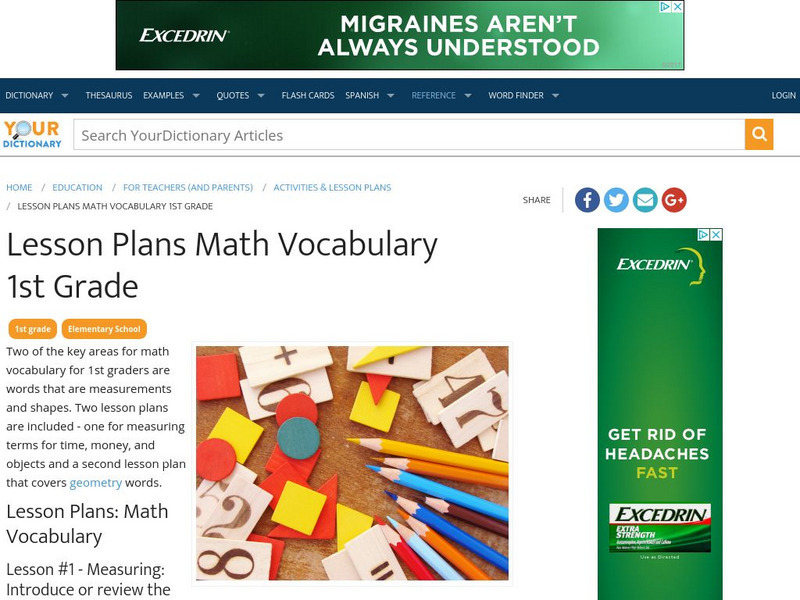Council for Economic Education
Econ Ed Link: Money Doesn't Grow on Trees
This lesson plan helps students distinguish between earned and unearned income by identifying methods for getting money.
Utah Education Network
Uen: Let's Find Out About Money
In this multisensory lesson, students will learn the characteristics of each coin (penny, nickel, dime and quarter) and the value for each type of coin. Students will learn record observational data, learn a song, recite a poem, and play...
Better Lesson
Better Lesson: Want to Trade?
Students will write about what they would trade for gold and practice inventive spelling in the process. After reading "In 1492", students will discuss how Christopher Columbus traded with the natives and then write what they would trade...
Khan Academy
Khan Academy: Lesson Summary: Banking and the Expansion of the Money Supply
This lesson summary from Khan Academy is intended for students who are taking the AP Macroeconomics course. In this lesson summary will review key terms and calculations related to fractional reserve banking, required reserves, excess...
Better Lesson
Better Lesson: Counting Up the Cost!
Fourth graders love to shop! In this exciting lesson, 4th graders will discover how to count money using some real world activities. This lesson includes a detailed lesson plan, printable worksheets, and a link to an online interactive...
Council for Economic Education
Econ Ed Link: Agent Pincher: P Is for Penny or Where Did Money Come From?
What if we woke up tomorrow and found that there were no more pennies? Or what if we found that money had disappeared altogether -- not only from our pockets but from banks, stores and all the other places where we would expect to find...
Federal Reserve Bank
Federal Reserve Bank of Philadelphia: What Is Money? [Pdf]
This lesson plan is designed to help children understand the problems which arise from the bartering system so they appreciate the role money has in society.
Better Lesson
Better Lesson: More Dimes and Dollars
Second graders need practice using coins and dollars and relating them to ones, tens and hundreds. Common Core standards include counting by 10s and 100s.
Khan Academy
Khan Academy: Lesson Summary: Public Policy and Economic Growth
In this lesson summary review and remind yourself of the key terms and concepts related to how policymakers can influence economic growth. This resource is designed as a review for the AP Macroeconomics Test or a college-level...
Scholastic
Scholastic: Adventures in Math: Lesson 2: Money Planning
What can we do with money? Deciding on the best use of our money requires planning. Students will identify ways that money can be used: spending, saving, and giving.
Scholastic
Scholastic: Adventures in Math: Lesson 1: Money Basics
Why do we use money? Learn why we need money and to identify bills and coins.
Science and Mathematics Initiative for Learning Enhancement (SMILE)
Smile: Estimating and Counting Money
The purpose of this lesson from the Illinois Institute of Technology is to review estimating and rounding to the nearest dollar as well as gain skills and practice in counting money. The students will define the meaning of estimate and...
Other
Ucce: Money Talks
This resource provides activities such as: savings video, youth money newletters, financial literacy games, related links, and a teacher section.
Internal Revenue Service
Irs: How Taxes Influence Behavior Lesson Plan
This lesson plan will help students understand how taxes may influence the way people spend and save their money.
University of Missouri
University of Missouri: Wise Pockets: Berenstain Bears' Trouble With Money
Using a Berenstain Bears' book, learners are introduced to concepts such as spending, goods, services, income, saving, and interest. Lesson is detailed and has good activities. Includes questions about the story that teach students about...
Love To Know Media
Your Dictionary: Lesson Plans Math Vocabulary 1st Grade
This site includes two first grade math vocabulary lesson plans: one for measurement terms and time and money, and another for geometry terms
Purple Math
Purplemath: "Coin" Word Problems
This site demonstrates how to solve 'coin' word problems, given relationships between the types of coins.
Scholastic
Scholastic: Adventures in Math: Lesson 4: How to Use Your Money
In this lesson, students will identify why having a budget and keeping records of their spending and saving habits helps them make better financial choices.
iCivics
I Civics: Executive Roles: Money Doesn't Grow on Trees?
Students learn the role of the executive branch in creating and carrying out laws and how the executive and legislative branches work together to create a new coin.
TED Talks
Ted: Ted Ed: Doug Levinson: What Gives a Dollar Bill Its Value?
The value of money is determined by how much (or how little) of it is in circulation. But who makes that decision, and how does their choice affect the economy at large? Doug Levinson takes a trip into the United States Federal Reserve,...
TED Talks
Ted: Ted Ed: How to Spot a Counterfeit Bill
Authentic dollar bills are equipped with many security features to make them difficult to forge. But that doesn't stop counterfeiters from trying to fool people with fakes. Luckily, anyone can help catch a counterfeit; all you need are a...
Council for Economic Education
Econ Ed Link: Where Does the Money Come From?
With very few exceptions, the U.S. federal government does not have an "income" to spend providing goods and services. The money used for federal spending programs must be collected as federal taxes, or it must be borrowed. This lesson...
TeachEngineering
Teach Engineering: Learn to Build a Rocket in 5 Days or Your Money Back
In this instructional activity, students discover the entire process that goes into designing a rocket for any customer. In prior lessons, students learned how rockets work, but now they learn what real-world decisions engineers have to...
Better Lesson
Better Lesson: Loans and Savings
What are loans and how do they work? How do banks encourage people to save money? Students work on these questions in the context of the College Project.
Other popular searches
- Money Lessons Giving Change
- Counting Money Lessons
- Canadian Money Lessons
- Second Grade Money Lessons
- 2nd Grade Money Lessons
- Australian Money Lessons
- Shopping Money Lessons
- Math Money Lessons
- Money Lessons Elementary
- Fun Money Lessons
- Counting Money Math Lessons
- Adding Money Amounts Lessons



![Federal Reserve Bank of Philadelphia: What Is Money? [Pdf] Lesson Plan Federal Reserve Bank of Philadelphia: What Is Money? [Pdf] Lesson Plan](http://content.lessonplanet.com/resources/thumbnails/409977/large/bwluav9tywdpy2symdiwmduymc0xmdq5ny16ejvsywouanbn.jpg?1589982800)












